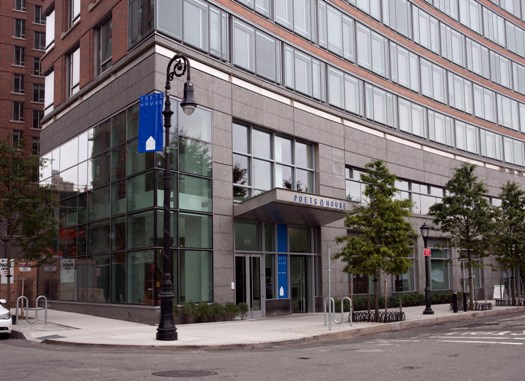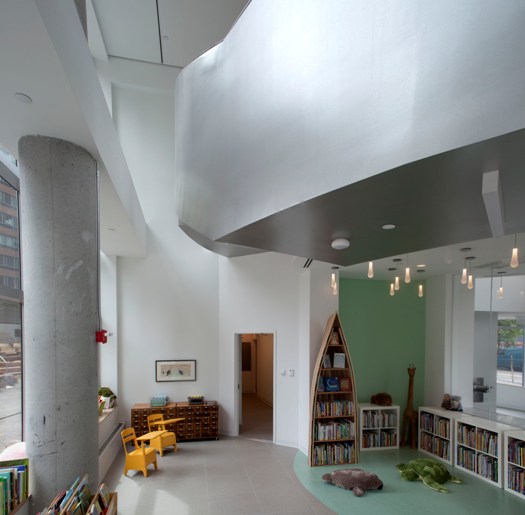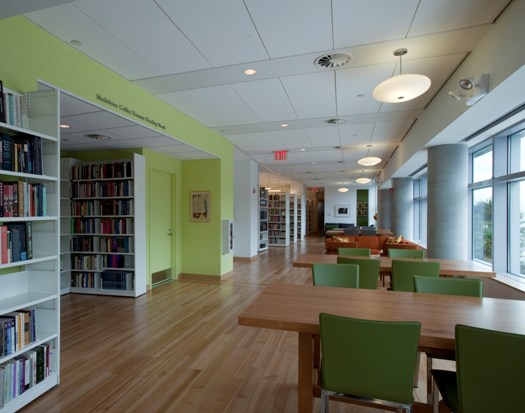theartsdesk in New York: Poets House | reviews, news & interviews
theartsdesk in New York: Poets House
theartsdesk in New York: Poets House
 The new Poets House (entrance, pictured right) is a sumptuous space on River Terrace in Battery Park City, beside the Hudson River. It’s just steps away from the Irish Hunger Memorial and from Riverhouse, the luxury eco-friendly condo tower (prices start at $1,275,000 for a one-bed) where Leonardo DiCaprio has an apartment. An Alexander Calder mobile - Calder has suitably poetic connections as he was a friend of Elizabeth Bishop and ee cummings - hangs at the double-height glass entrance lobby. Upstairs, in the block-long reading room, all is luxe, calme et volupté. Beechwood floors (from sustainable forests, of course) stretch ahead as you walk past the new journals - anything with poetry in it gets a place - then on to new poetry divided by subject and country (cooking, death, Dutch), then the A-Z of older books.
The new Poets House (entrance, pictured right) is a sumptuous space on River Terrace in Battery Park City, beside the Hudson River. It’s just steps away from the Irish Hunger Memorial and from Riverhouse, the luxury eco-friendly condo tower (prices start at $1,275,000 for a one-bed) where Leonardo DiCaprio has an apartment. An Alexander Calder mobile - Calder has suitably poetic connections as he was a friend of Elizabeth Bishop and ee cummings - hangs at the double-height glass entrance lobby. Upstairs, in the block-long reading room, all is luxe, calme et volupté. Beechwood floors (from sustainable forests, of course) stretch ahead as you walk past the new journals - anything with poetry in it gets a place - then on to new poetry divided by subject and country (cooking, death, Dutch), then the A-Z of older books.
You can take a battered blue Cambridge edition of Tennyson’s poetical works from the 50,000 volumes on the shelves (all donated, some by poets with their underlinings intact, some by publishers); this Tennyson comes from the collection of Paul Zweig) and sit down on a comfy sofa in the bright, airy room, sunlight gleaming through the huge windows with fabulous views of the Hudson and the Statue of Liberty. You discover, as you turn the thin old pages that "Ring out, wild bells" is actually part CVI of the CXXXI parts of In Memoriam A.H.H. You can also bring coffee and muffins, plug your laptop in, join the free wireless network and stay for hours - a steal compared with the $25 a day that other writers’ work spaces in the area charge. This is a reading room, not a lending library, so all the more reason to linger. Opposite in Nelson Rockefeller Park, kids make sandcastles in the playground and the leaves are golden. Ferries go across the Hudson to New Jersey, some of them with a line of poetry on the side - a Poets House initiative. And God knows, New Jersey needs poetry.
For 17 years Poets House was in funkier surroundings, half the size, in a cramped dark loft in Spring Street, SoHo, but the rent rocketed. Now it pays the Battery Park City Authority, which has a public amenity programme that offers rent-free leases to a few non-profits, $1 a year for 60 years. Bill Murray (he read Emily Dickinson to the construction workers), Tom’s of Maine (Kate Cheney Chappell, its co-founder, is a poet) and the Carnegie corporation are among those who donated some of the $8.7 million it took to build the space - 50 per cent was from private funding, 50 per cent from public.
Battery Park is looked down on by some for not being a real New York neighborhood - too clean, too man-made, a "planned community" at the south-western tip of Manhattan, built on the Hudson on landfill from the building of the World Trade Center in the late 1970s and early 1980s. Where Poets House stands, the river once ran. After 9/11, many people left, then reduced rents led them back, and now you’d never know there’d been an exodus: every year another towering steel and glass apartment building springs up, primary schools are bursting, labradoodles and puggles parade and families throng the recently opened Wholefoods, Bed Bath & Beyond and Barnes & Noble.
 Was SoHo a more poetic home for Poets House? Perhaps in the early 1990s, but no longer. The new streamlined facilities can’t be beaten. Traffic is brisk, with old hands and regulars dropping by, along with new faces. Thirty thousand visitors a year are expected. Battery Park security workers lounge on a sofa reading poetry; French women, checking out the French section, exclaim, "Non, mais c’est magnifique." School field trips are flourishing, though Mike Romanos, poet and coordinator of the Children’s Room downstairs (picture left), has to explain that books can’t be borrowed. An empty bird cage provides inspiration for poem-writing and two typewriters, one of them Kunitz’s - "It’s like a screenless computer," explained a parent - are a big hit; most of the kids have never seen one. If you pay $40 a year to join, you get free admission to the programs - talks, discussions, workshops - held in summer in a dramatically rocky outdoor amphitheatre opening soon.
Was SoHo a more poetic home for Poets House? Perhaps in the early 1990s, but no longer. The new streamlined facilities can’t be beaten. Traffic is brisk, with old hands and regulars dropping by, along with new faces. Thirty thousand visitors a year are expected. Battery Park security workers lounge on a sofa reading poetry; French women, checking out the French section, exclaim, "Non, mais c’est magnifique." School field trips are flourishing, though Mike Romanos, poet and coordinator of the Children’s Room downstairs (picture left), has to explain that books can’t be borrowed. An empty bird cage provides inspiration for poem-writing and two typewriters, one of them Kunitz’s - "It’s like a screenless computer," explained a parent - are a big hit; most of the kids have never seen one. If you pay $40 a year to join, you get free admission to the programs - talks, discussions, workshops - held in summer in a dramatically rocky outdoor amphitheatre opening soon.
 Hip young staff members, some paid, some volunteers, most of them poets, man the reception desk, replace books after you’ve finished with them and catalogue the collection, which also includes hundreds of immaculately alphabetised chapbooks and many gorgeous vintage LPs. You can sit and listen to recordings of Ferlinghetti, Plath, Sexton, and lots more, either on tape or iPod. There’s a quiet room, off the general reading room, hung with portraits of poets who read at the old Poets House, Robert Bly, Adrienne Rich, Gwendolyn Brooks and Thom Gunn among them. On the walls are Stanley Kunitz’s collection of paintings, many of them illustrations of his poems by Philip Guston and two - a still life and a landscape - by ee cummings. Kunitz’s Webster’s lies open on a wooden lectern, a new page turned each day.
Hip young staff members, some paid, some volunteers, most of them poets, man the reception desk, replace books after you’ve finished with them and catalogue the collection, which also includes hundreds of immaculately alphabetised chapbooks and many gorgeous vintage LPs. You can sit and listen to recordings of Ferlinghetti, Plath, Sexton, and lots more, either on tape or iPod. There’s a quiet room, off the general reading room, hung with portraits of poets who read at the old Poets House, Robert Bly, Adrienne Rich, Gwendolyn Brooks and Thom Gunn among them. On the walls are Stanley Kunitz’s collection of paintings, many of them illustrations of his poems by Philip Guston and two - a still life and a landscape - by ee cummings. Kunitz’s Webster’s lies open on a wooden lectern, a new page turned each day.
In his poem "An Urban Convalescence", Frank O’Hara wrote: "As usual in New York, everything is torn down/Before you have had time to care for it." But in this shining Poets House, there’s an unusual feeling of permanence and peace.
Poets House, 10 River Terrace, New York, NY 10282; 212 431 7920. Open 11am to 7pm on weekdays and to 6pm on Saturdays. Entry is free.
Add comment
more
 theartsdesk Q&A: Marco Bellocchio - the last maestro
Italian cinema's vigorous grand old man discusses Kidnapped, conversion, anarchy and faith in cinema
theartsdesk Q&A: Marco Bellocchio - the last maestro
Italian cinema's vigorous grand old man discusses Kidnapped, conversion, anarchy and faith in cinema
 Testmatch, Orange Tree Theatre review - Raj rage, old and new, flares in cricket dramedy
Winning performances cannot overcome a scattergun approach to a ragbag of issues
Testmatch, Orange Tree Theatre review - Raj rage, old and new, flares in cricket dramedy
Winning performances cannot overcome a scattergun approach to a ragbag of issues
 Album: Justice - Hyperdrama
French electronic dance stalwarts return from eight-year break in fine fettle
Album: Justice - Hyperdrama
French electronic dance stalwarts return from eight-year break in fine fettle
 Classical CDs: Swans, hamlets and bossa nova
A promising young pianist's debut disc, plus Finnish mythology and a trio of neglected British composers
Classical CDs: Swans, hamlets and bossa nova
A promising young pianist's debut disc, plus Finnish mythology and a trio of neglected British composers
 I.S.S. review - sci-fi with a sting in the tail
The imperilled space station isn't the worst place to be
I.S.S. review - sci-fi with a sting in the tail
The imperilled space station isn't the worst place to be
 Album: St Vincent - All Born Screaming
Annie Clark transcends indie’s average leanings
Album: St Vincent - All Born Screaming
Annie Clark transcends indie’s average leanings
 Eye to Eye: Homage to Ernst Scheidegger, MASI Lugano review - era-defining artist portraits
One of Switzerland's greatest photographers celebrated with a major retrospective
Eye to Eye: Homage to Ernst Scheidegger, MASI Lugano review - era-defining artist portraits
One of Switzerland's greatest photographers celebrated with a major retrospective
 Christian Pierre La Marca, Yaman Okur, St Martin-in-The-Fields review - engagingly subversive pairing falls short
A collaboration between a cellist and a breakdancer doesn't achieve lift off
Christian Pierre La Marca, Yaman Okur, St Martin-in-The-Fields review - engagingly subversive pairing falls short
A collaboration between a cellist and a breakdancer doesn't achieve lift off
 That They May Face The Rising Sun review - lyrical adaptation of John McGahern's novel
Pat Collins extracts the magic of country life in the west of Ireland in his third feature film
That They May Face The Rising Sun review - lyrical adaptation of John McGahern's novel
Pat Collins extracts the magic of country life in the west of Ireland in his third feature film
 Album: Pet Shop Boys - Nonetheless
Longing, love and longevity as the duo resolutely refuse retirement
Album: Pet Shop Boys - Nonetheless
Longing, love and longevity as the duo resolutely refuse retirement
 Ridout, Włoszczowska, Crawford, Lai, Posner, Wigmore Hall review - electrifying teamwork
High-voltage Mozart and Schoenberg, blended Brahms, in a fascinating programme
Ridout, Włoszczowska, Crawford, Lai, Posner, Wigmore Hall review - electrifying teamwork
High-voltage Mozart and Schoenberg, blended Brahms, in a fascinating programme
 Stephen review - a breathtakingly good first feature by a multi-media artist
Melanie Manchot's debut is strikingly intelligent and compelling
Stephen review - a breathtakingly good first feature by a multi-media artist
Melanie Manchot's debut is strikingly intelligent and compelling

Comments
...
...